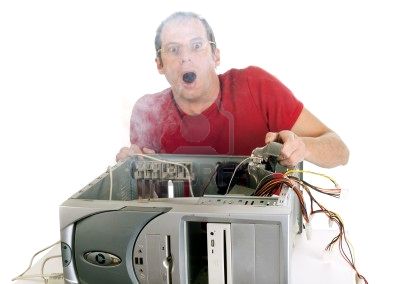Why you should do a regular system audit
Having your system audited is a crucial task that is often overlooked by small businesses. An annual system audit will give you an overview of the state of your system, from the ground up: network, power supply, backups, server, workstations, etc. It should also include recommendations from a professional; for example, if your server is three years old, you might get a recommendation to start allocating some income to replace the server in a couple of years.

Make sure to conduct regular system audits or you’ll pay the price later!
Take a second, and think about how your business would cope if your server or network went down. Do you have the right measures in place to ensure that all of your hard-earned data is not lost? Too often businesses take their systems for granted, and it’s that mentality that can bite them later on.
To help you, we’ve shared our handy little checklist for system audits. This is what we step through when we’re investigating a system, and it should help make sure that each aspect of your system is inspected.
Network, PC, and Server Audit Checklist
Besides the checklist, there are also certain aspects that you can look at yourself:
Age
How old is your hardware? It all differs on the exact type of hardware that you are dealing with, but as a general rule of thumb, you probably don’t want it to be any more than 3-4 years of age. Technology is advancing pretty quickly these days, and so older hardware can take much longer to complete tasks than its younger counterparts. Older hardware also has a much higher risk of sudden collapse, which means you would be left with one very expensive paperweight.
Speed
Reflecting further on speed, you should also check whether there are any adverse effects because of the low speed. Is it hurting the activities of your business? If it’s taking fifteen minutes to complete a task that should normally take five, then you have a problem.
For a bit of extra speed, make sure to regularly clean and defrag your computer. Viruses, spyware, unused programs and a fragmented drive can all slow you down and become a real nuisance. With regular maintenance, you’ll keep that extra bit of speed and avoid higher costs later on. Two handy (and free) programs to help you out in this regard are CCleaner and Defraggler.
Software
There is an age-old conflict in computing between the reliability of software and security. You’ll want to update your software regularly, but you’ll need to implement a bit of strategy as to when you make your updates. There is no point in updating to something that is far more secure if it’s hard to understand and costs you more productivity than it’s worth.
The most common example I can think of is the Windows OS. Many people were uneager to upgrade from XP to Vista because the interface had changed quite a lot and there were a lot of bugs. The benefits just didn’t seem to outweigh the costs. However, when Microsoft released Windows 7 a short while later, most of the bugs had been ironed out and a lot more people felt willing to upgrade.
Setup
Is your current setup working well? Or could you adapt certain parts of your system to work better? Sure, it may be getting the job done, but with a few little tweaks you could get so much more done, which is crucial in a fast-paced environment.
Points of Failure
The last point, and arguably the most important, is to measure how many single points of failure that your system has. Once you’ve discovered just how many there are, you can pair each up with a duplicate, so that if one fails you still have something to fall back on. The only points that you wouldn’t consider backing up are your computer and the cable that connects your computer to the server. Everything else is fair game (server, modem, UPS, etc). Though it might seem a lot of work initially, it will save you a lot of frustration later on.
So there you have it, a quick guide as to why regular systems audits are a good idea. With fewer costs and less headaches further down the track, i’m sure you’d agree.

